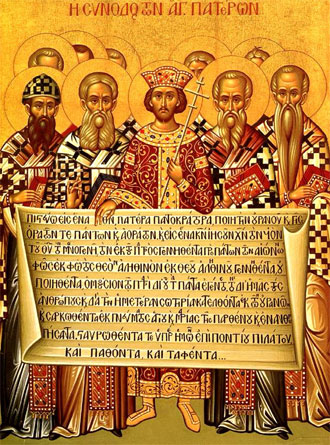 HOME HOME  ARTICLES ARTICLES  BIBLES BIBLES  LINKS LINKS  HERETIC HERETIC
 The Council of Laodicea The Council of Laodicea
The Council of Laodicea, a church council held in the mid-4th century, took steps to outlaw Sabbath-keeping and the observance of biblical holy days, favoring Sunday worship instead. This action is a key point in the history of Sabbath rejection and Sunday observance in Christianity.
Basic Key point Summary:
- When and Who: The Council of Laodicea took place around 363-364 AD in Laodicea, Phrygia Pacatiana. It was a local council of approximately thirty clerics, primarily from Asia Minor, convened to address various issues within the church.
- Canon 29: One of the most significant canons from this council, Canon 29, stated, "Christians must not judaize by resting on the Sabbath, but must work on that day, rather honouring the Lord's Day; and, if they can, resting then as Christians". This canon effectively outlawed Sabbath-keeping and promoted Sunday observance.
- Anti-Jewish Sentiment: The council's actions are often seen as reflecting anti-Jewish sentiments prevalent in some segments of the early church, viewing Sabbath observance as a "Jewish" practice that should be abandoned by Christians.
- Shift to Sunday: The Council of Laodicea's decision contributed to the shift in the Christian world from Sabbath (Saturday) to Sunday as the primary day of worship.
- Controversy and Debate: The council's actions regarding Sabbath observance remain a point of controversy and debate, with some arguing that it was a necessary step to distinguish Christianity from Judaism, while others criticize it as a departure from biblical teachings and a concession to pagan sun worship (Mithraism).
- Long-Term Impact: The Council of Laodicea's decision had a lasting impact on Christian practice, influencing the development of the Western Christian tradition of Sunday worship.

The council took place soon after the conclusion of the war between the Roman Empire and the Persian Empire, waged by Emperor Julian. Julian, the last Constantinian emperor, attempted a revival of paganism. After his death in battle on 26 June 363, officers of the army elected the Christian Jovian as his successor. Jovian, in a precarious position, far from supplies, ended the war with Persia unfavorably for Rome. He was soon succeeded by Valentinian I, who named his brother Valens as Emperor of the East.
Major Concerns
The major concerns of the council involved regulating the conduct of church members. The council expressed its decrees in the form of written rules or canon. Among the sixty canons decreed, several aimed at:
- Maintaining order among bishops, clerics and laypeople (canons 3–5, 11–13, 21–27, 40–44, 56–57)
- Enforcing modest behavior of clerics and laypeople (4, 27, 30, 36, 53–55)
- Regulating approach to heretics (canons 6–10, 31–34, 37), Jews (canons 16, 37–38) and pagans (canon 39)
- Outlawing Judaizing by resting on the Sabbath (Saturday), and encouraging rest on Sunday (canon 29)
- Outlining liturgical practices (canons 14–20, 21–23, 25, 28, 58–59)
- Restrictions during lent (canons 45, 49–52)
- Admission and instruction of catechumens and neophytes (canons 45–48)
- Specifying a biblical canon (canons 59–60)
Biblical canon
The 59th canon forbade the readings in churches of uncanonical books. The 60th canon listed canonical books, with the New Testament containing 26 books, omitting the Book of Revelation, and the Old Testament including 22 books from the Tanakh and some deuterocanonical books as the Book of Baruch, and the Epistle of Jeremiah.
The authenticity of the 60th canon is doubtful, as it is missing from various Greek manuscripts and may have been added later to specify the extent of the preceding 59th canon. The Latin version of the canons of Laodicea consistently omit the canon list. Earlier, around 350, Cyril of Jerusalem had produced a list of biblical books similar to that of the disputed 60th canon. (Wikipidea).
Return to top 
 HOME HOME  ARTICLES ARTICLES  BIBLES BIBLES  LINKS LINKS  HERETIC HERETIC
|


|




